【BBC六分钟英语】你拥有自己的主见吗?
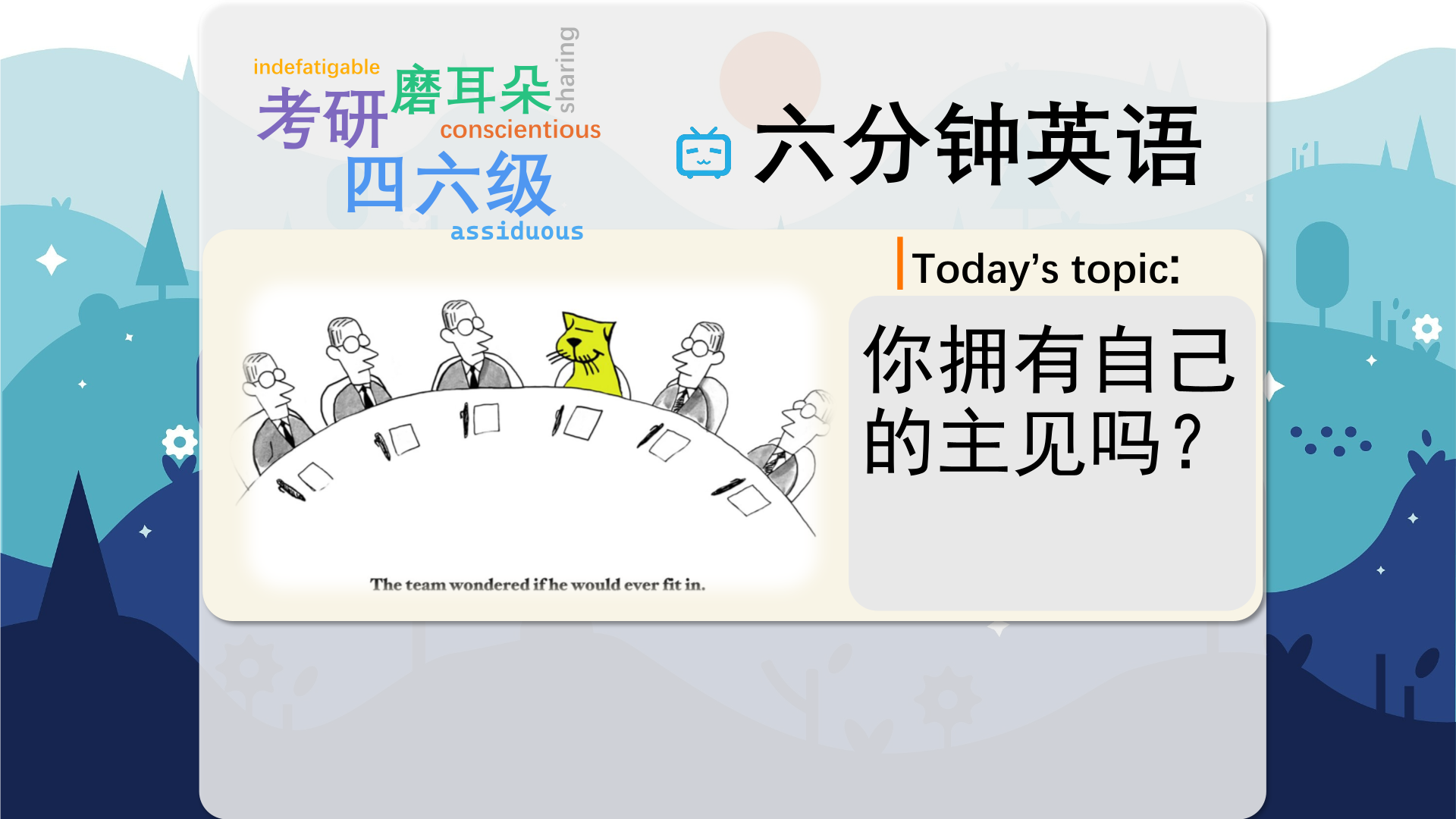
【英文脚本】
Sophie
Hello and welcome to 6 Minute English. I’m Sophie…
Neil
And I’m Neil… Here’s your coffee, Sophie.
Sophie
Neil, remember that staff meeting we had yesterday? Why did you agree to having decaff coffee in the kitchen when I know you don’t like it… and neither do I!
Neil
I know. It’s just that the boss said that decaffeinated coffee, that’s coffee with the caffeine removed, was a good idea, healthier, you know. And then everyone else agreed. And I… I don’t know… I just felt uncomfortable disagreeing with everyone.
Sophie
Well, it’s interesting you should say that, Neil. Groupthink is the subject of today’s show. Groupthink refers to the type of bad decisions we make when we are in a group. Decisions that are contrary to, or against, what we really think. A psychology experiment conducted in the 1950s showed that a lot of people do exactly that, they submit to the will of the group.
Neil
But before we hear more about this, now would be a good time for today’s quiz question. And I get to ask you, Sophie!
Sophie
OK. What is it?
Neil
In which story by Hans Christian Andersen does a young boy dare to tell the truth when everyone else goes along with an obvious lie? Is it… a) The Red Shoes b) The Snow Queen Or c) The Emperor’s New Clothes
Sophie
OK… I think it’s c) The Emperor’s New Clothes.
Neil
Well, we’ll find out later on in the show if that’s right or not. Now, the psychologist Solomon Asch is well known for his conformity experiments from the 1950s. Can you tell us what ‘conformity’ means please, Sophie?
Sophie
Conformity means behaviour that is the same as the way most other people behave. Asch’s main finding was that group pressure can change a person’s opinion, of even obvious facts.
Neil
And what did this Asch test involve?
Sophie
123 male participants were shown a card with a line on it, followed by another card with three lines on it. The participants were then asked to say which line matched the line on the first card in length. The right answer was plain to see, but the participants felt pressurized into saying the wrong answer.
Neil
Why would they do that?
Sophie
Because the majority of people taking part in the experiment had been told to give the wrong answer. Let’s hear Professor Nick Chater’s explanation. He works at the Warwick Business School here in the UK.
Nick Chater, Professor at Warwick Business School, UK
By the time it comes to you a whole list of people have said something plainly wrong and you are either going to have to fold and say, ‘well, I just agree with them’ or you’re going to rather uncomfortably say, ‘well, I think it’s one actually’. And most people, most of the time, tend to fold.
Neil
Professor Nick Chater. He uses the word fold, which means you give up. But, Sophie, if people are uncomfortable about supporting the wrong answer, or something they don’t believe in, why do they do it?
Sophie
Because even though we feel uncomfortable going along with, or agreeing with – something we don’t believe, we’re even more uncomfortable about disagreeing with the group.
Neil
Well, I didn’t realize that people were such sheep. I have a will of steel, Sophie.
Sophie
Is that right? So, your will of steel, or strong determination, somehow melted away in the staff meeting yesterday, I suppose?
Neil
Oh well… of course… yes…
Sophie
Let’s move on and consider briefly how social media encourages groupthink.
Neil
Yes, there’s a real danger with something like, for example, the Twitter, the social networking service. Because when an opinion on Twitter starts to “trend”, it can take on a momentum of its own, and people adopt it simply because it’s popular, not because they really believe it.
Sophie
And momentum means a force that keeps something going once it has started. Let’s hear from journalist and author, Jon Ronson. He has an interesting opinion about this.
Jon Ronson, journalist and author
One of the ironies here is that on social media we all like to see ourselves as nonconformists but when we all get together in a group what we’re doing is using our individual nonconformity to create a more conformist world. So if somebody steps out of line, all us nonconformists, in this frightened conformist way, tear them apart. It’s like we’re defining the boundaries of normality by tearing apart the people on the outside.
Sophie
Jon Ronson. Are you a nonconformist then, Neil, someone who thinks and behaves differently from other people?
Neil
I’m not the type that Jon Ronson is describing, one who joins up with other so-called nonconformists to bully people with different views. Now remember I asked you earlier: In which story by Hans Christian Andersen does a young boy dare to tell the truth when everyone else goes along with an obvious lie? Is it… a) The Red Shoes, b) The Snow Queen or c) The Emperor’s New Clothes?
Sophie
I guessed c) The Emperor’s New Clothes.
Neil
And you were right, Sophie! The Emperor’s New Clothes is a story by Hans Christian Andersen about two weavers who promise an emperor a new suit of clothes that is invisible to those who are stupid or incompetent. No one dares to say that he doesn’t see any suit of clothes until a child cries out, “But he isn’t wearing anything at all!”
Sophie
It’s a great story, and a lesson to us all. Now can we hear the words we learned today please?
Neil
They are: decaffeinated groupthink contrary to conformity fold going along with will of steel momentum nonconformist
Sophie
Well, that’s the end of today’s 6 Minute English. Don’t forget to join us again soon!
Both
Bye.
【中英文双语脚本】
Sophie(苏菲)
Hello and welcome to 6 Minute English. I’m Sophie…
您好,欢迎来到 6 Minute English。我是 Sophie…
Neil(尼尔)
And I’m Neil… Here’s your coffee, Sophie.
我是 Neil……这是你的咖啡,苏菲。
Sophie(苏菲)
Neil, remember that staff meeting we had yesterday? Why did you agree to having decaff coffee in the kitchen when I know you don’t like it… and neither do I!
Neil,还记得我们昨天开的员工会议吗?为什么我知道你不喜欢无咖啡因咖啡就同意在厨房里喝它……我也没有!
Neil(尼尔)
I know. It’s just that the boss said that decaffeinated coffee, that’s coffee with the caffeine removed, was a good idea, healthier, you know. And then everyone else agreed. And I… I don’t know… I just felt uncomfortable disagreeing with everyone.
我知道。只是老板说,不含咖啡因的咖啡,也就是去除咖啡因的咖啡,是个好主意,更健康,你知道的。然后其他人都同意了。而我……我不知道。。。我只是觉得不同意每个人的意见很不舒服。
Sophie(苏菲)
Well, it’s interesting you should say that, Neil. Groupthink is the subject of today’s show. Groupthink refers to the type of bad decisions we make when we are in a group. Decisions that are contrary to, or against, what we really think. A psychology experiment conducted in the 1950s showed that a lot of people do exactly that, they submit to the will of the group.
嗯,你应该这么说很有趣,Neil。Groupthink 是今天节目的主题。群体思维是指我们在群体中时做出的错误决定类型。与我们的真实想法相反或相反的决定。1950 年代进行的一项心理学实验表明,很多人正是这样做的,他们服从群体的意愿。
Neil(尼尔)
But before we hear more about this, now would be a good time for today’s quiz question. And I get to ask you, Sophie!
但在我们听到更多关于这方面的信息之前,现在是今天测验问题的好时机。我得问你,Sophie!
Sophie(苏菲)
OK. What is it?
还行。这是什么?
Neil(尼尔)
In which story by Hans Christian Andersen does a young boy dare to tell the truth when everyone else goes along with an obvious lie? Is it… a) The Red Shoes b) The Snow Queen Or c) The Emperor’s New Clothes
在汉斯·克里斯蒂安·安徒生 (Hans Christian Andersen) 的哪个故事中,当其他人都同意一个明显的谎言时,一个小男孩敢说真话?是吗。。。a) 红鞋 b) 冰雪女王 或 c) 皇帝的新衣
Sophie(苏菲)
OK… I think it’s c) The Emperor’s New Clothes.
还行。。。我认为是 c) The Emperor’s New Clothes。
Neil(尼尔)
Well, we’ll find out later on in the show if that’s right or not. Now, the psychologist Solomon Asch is well known for his conformity experiments from the 1950s. Can you tell us what ‘conformity’ means please, Sophie?
好吧,我们稍后会在节目中发现这是否正确。现在,心理学家所罗门·阿什 (Solomon Asch) 以其 1950 年代的从众实验而闻名。Sophie,您能告诉我们“从众”是什么意思吗?
Sophie(苏菲)
Conformity means behaviour that is the same as the way most other people behave. Asch’s main finding was that group pressure can change a person’s opinion, of even obvious facts.
从众意味着与大多数其他人的行为方式相同的行为。Asch 的主要发现是,群体压力可以改变一个人的看法,即使是显而易见的事实。
Neil(尼尔)
And what did this Asch test involve?
这个 Asch 测试涉及什么?
Sophie(苏菲)
123 male participants were shown a card with a line on it, followed by another card with three lines on it. The participants were then asked to say which line matched the line on the first card in length. The right answer was plain to see, but the participants felt pressurized into saying the wrong answer.
向 123 名男性参与者展示了一张带有一条线的卡片,然后是另一张带有三条线的卡片。然后让参与者说出哪条线的长度与第一张卡片上的线相匹配。正确的答案是显而易见的,但参与者感到有压力说出错误的答案。
Neil(尼尔)
Why would they do that?
他们为什么要这样做呢?
Sophie(苏菲)
Because the majority of people taking part in the experiment had been told to give the wrong answer. Let’s hear Professor Nick Chater’s explanation. He works at the Warwick Business School here in the UK.
因为大多数参与实验的人都被告知要给出错误的答案。让我们听听 Nick Chater 教授的解释。他在英国的华威商学院工作。
Nick Chater, Professor at Warwick Business School, UK(NickChater,英国华威商学院教授)
By the time it comes to you a whole list of people have said something plainly wrong and you are either going to have to fold and say, ‘well, I just agree with them’ or you’re going to rather uncomfortably say, ‘well, I think it’s one actually’. And most people, most of the time, tend to fold.
当一整人都说了一些明显错误的话时,你要么不得不折叠并说,“嗯,我只是同意他们的看法”,要么你会相当不舒服地说,“嗯,我认为这实际上是一个”。而且大多数人,大多数时候,倾向于弃牌。
Neil(尼尔)
Professor Nick Chater. He uses the word fold, which means you give up. But, Sophie, if people are uncomfortable about supporting the wrong answer, or something they don’t believe in, why do they do it?
Nick Chater 教授。他用了 fold 这个词,意思是你放弃了。但是,Sophie,如果人们对支持错误的答案或他们不相信的东西感到不舒服,他们为什么要这样做呢?
Sophie(苏菲)
Because even though we feel uncomfortable going along with, or agreeing with – something we don’t believe, we’re even more uncomfortable about disagreeing with the group.
因为即使我们不同意或同意 – 我们不相信的东西,我们也会因为不同意这个群体而感到更不舒服。
Neil(尼尔)
Well, I didn’t realize that people were such sheep. I have a will of steel, Sophie.
好吧,我没有意识到人们就是这样的羊。我有钢铁般的意志,苏菲。
Sophie(苏菲)
Is that right? So, your will of steel, or strong determination, somehow melted away in the staff meeting yesterday, I suppose?
是吗?所以,我想,你的钢铁意志或坚强的决心,不知何故在昨天的员工会议上融化了吧?
Neil(尼尔)
Oh well… of course… yes…
哦,好吧……答案是肯定的。。。是的。。。
Sophie(苏菲)
Let’s move on and consider briefly how social media encourages groupthink.
让我们继续简要地考虑一下社交媒体如何鼓励群体思维。
Neil(尼尔)
Yes, there’s a real danger with something like, for example, the Twitter, the social networking service. Because when an opinion on Twitter starts to “trend”, it can take on a momentum of its own, and people adopt it simply because it’s popular, not because they really believe it.
是的,例如社交网络服务 Twitter 之类的东西确实存在危险。因为当 Twitter 上的观点开始“流行”时,它就会有自己的动力,人们采用它仅仅是因为它很受欢迎,而不是因为他们真的相信它。
Sophie(苏菲)
And momentum means a force that keeps something going once it has started. Let’s hear from journalist and author, Jon Ronson. He has an interesting opinion about this.
动量意味着一旦事物开始就保持运转的力量。让我们听听记者兼作家 Jon Ronson 的意见。他对此有一个有趣的观点。
Jon Ronson, journalist and author(JonRonson,记者和作家)
One of the ironies here is that on social media we all like to see ourselves as nonconformists but when we all get together in a group what we’re doing is using our individual nonconformity to create a more conformist world. So if somebody steps out of line, all us nonconformists, in this frightened conformist way, tear them apart. It’s like we’re defining the boundaries of normality by tearing apart the people on the outside.
具有讽刺意味的是,在社交媒体上,我们都喜欢将自己视为不墨守成规的人,但当我们都聚在一起时,我们所做的就是利用我们个人的不墨守成规来创造一个更加墨守成规的世界。所以,如果有人越界了,我们所有不墨守成规的人,都以这种害怕的墨守成规的方式,把他们撕裂。这就像我们通过撕裂外面的人来定义常态的界限。
Sophie(苏菲)
Jon Ronson. Are you a nonconformist then, Neil, someone who thinks and behaves differently from other people?
乔恩·罗森。那么,尼尔,你是一个不墨守成规的人,一个思考和行为与其他人不同的人吗?
Neil(尼尔)
I’m not the type that Jon Ronson is describing, one who joins up with other so-called nonconformists to bully people with different views. Now remember I asked you earlier: In which story by Hans Christian Andersen does a young boy dare to tell the truth when everyone else goes along with an obvious lie? Is it… a) The Red Shoes, b) The Snow Queen or c) The Emperor’s New Clothes?
我不是乔恩·罗森(Jon Ronson)所描述的那种人,那种会与其他所谓的不墨守成规的人一起欺负持不同观点的人的人。现在回想一下我之前问过你:在汉斯·克里斯蒂安·安徒生 (Hans Christian Andersen) 的哪个故事中,当其他人都同意一个明显的谎言时,一个小男孩敢说真话?是吗。。。a) 红鞋,b) 冰雪女王还是 c) 皇帝的新衣?
Sophie(苏菲)
I guessed c) The Emperor’s New Clothes.
我猜 c) 皇帝的新衣。
Neil(尼尔)
And you were right, Sophie! The Emperor’s New Clothes is a story by Hans Christian Andersen about two weavers who promise an emperor a new suit of clothes that is invisible to those who are stupid or incompetent. No one dares to say that he doesn’t see any suit of clothes until a child cries out, “But he isn’t wearing anything at all!”
你是对的,苏菲!《皇帝的新衣》是汉斯·克里斯蒂安·安徒生 (Hans Christian Andersen) 的一个故事,讲述了两个织工向皇帝承诺一套愚蠢或无能的人看不见的新衣服。没有人敢说他没有看到任何一套衣服,直到一个孩子大声喊道:“但他根本什么都没穿!
Sophie(苏菲)
It’s a great story, and a lesson to us all. Now can we hear the words we learned today please?
这是一个很棒的故事,也是我们所有人的教训。现在我们能听到我们今天学到的词吗?
Neil(尼尔)
They are: decaffeinated groupthink contrary to conformity fold going along with will of steel momentum nonconformist
他们是:不含咖啡因的群体思维 与顺从相反 折叠 顺从钢铁的意志 动力 不顺从者
Sophie(苏菲)
Well, that’s the end of today’s 6 Minute English. Don’t forget to join us again soon!
好了,今天的六分钟 English 到此结束。别忘了很快再次加入我们!
Both(双)
Bye.
再见。

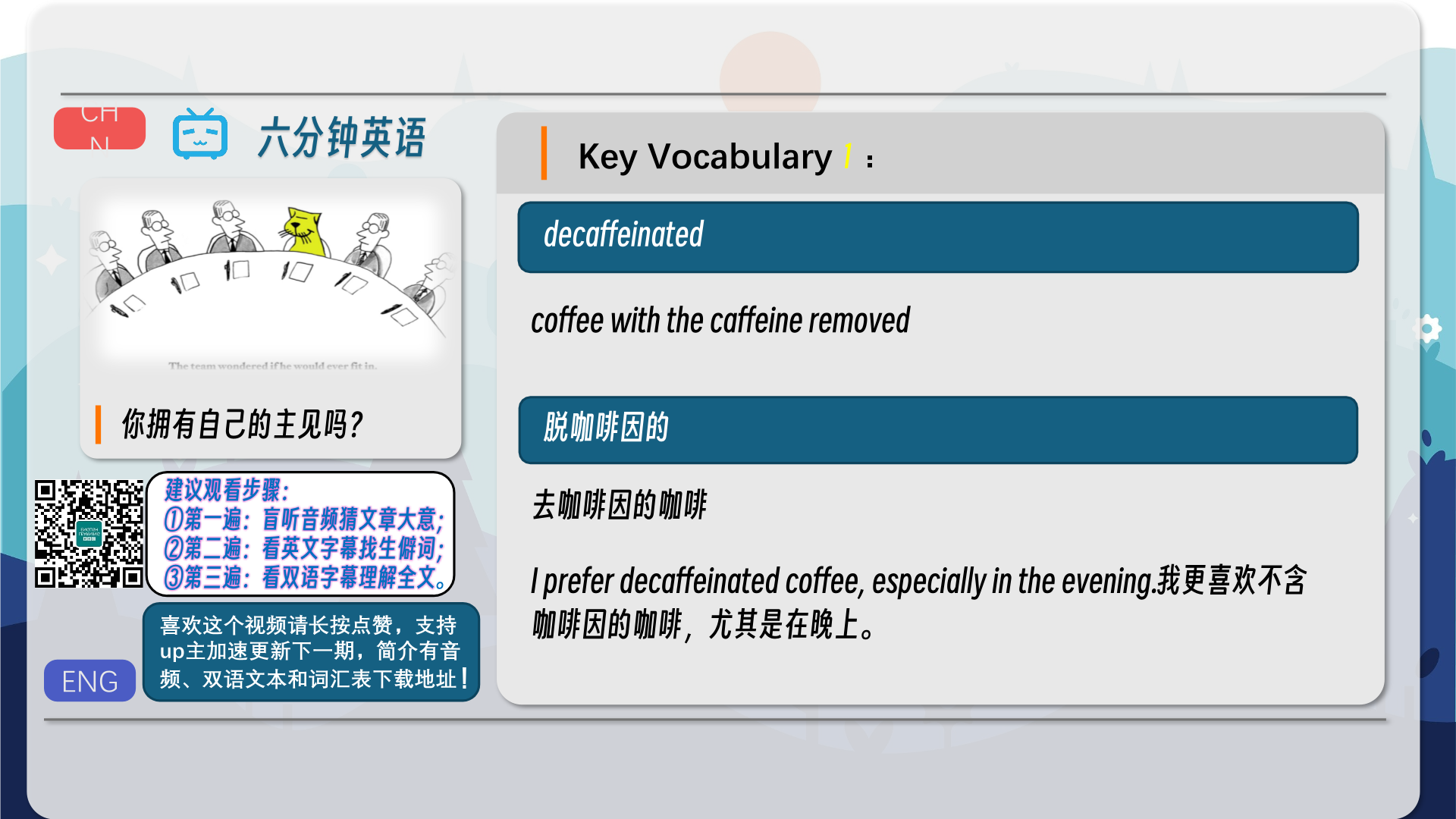
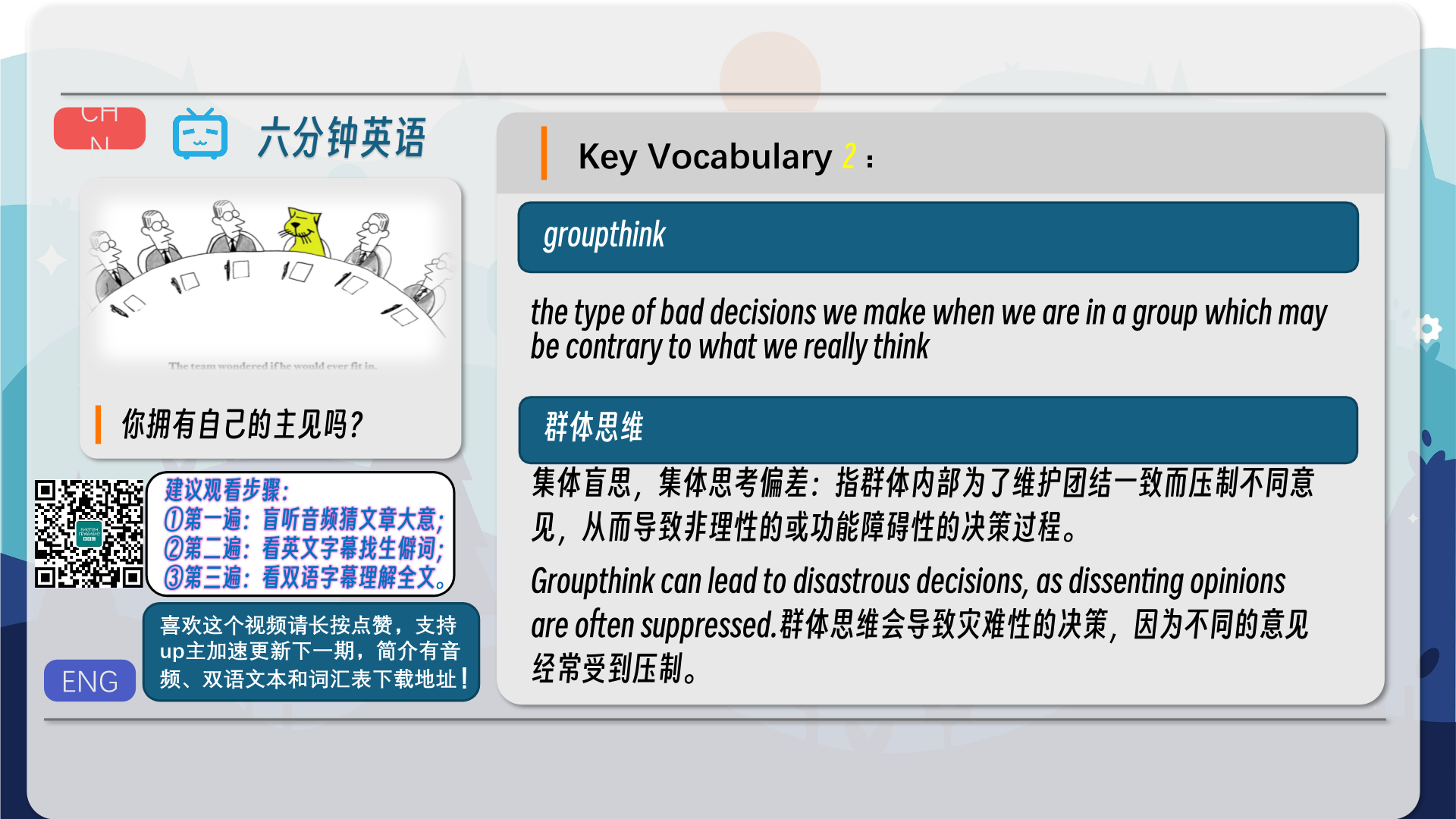
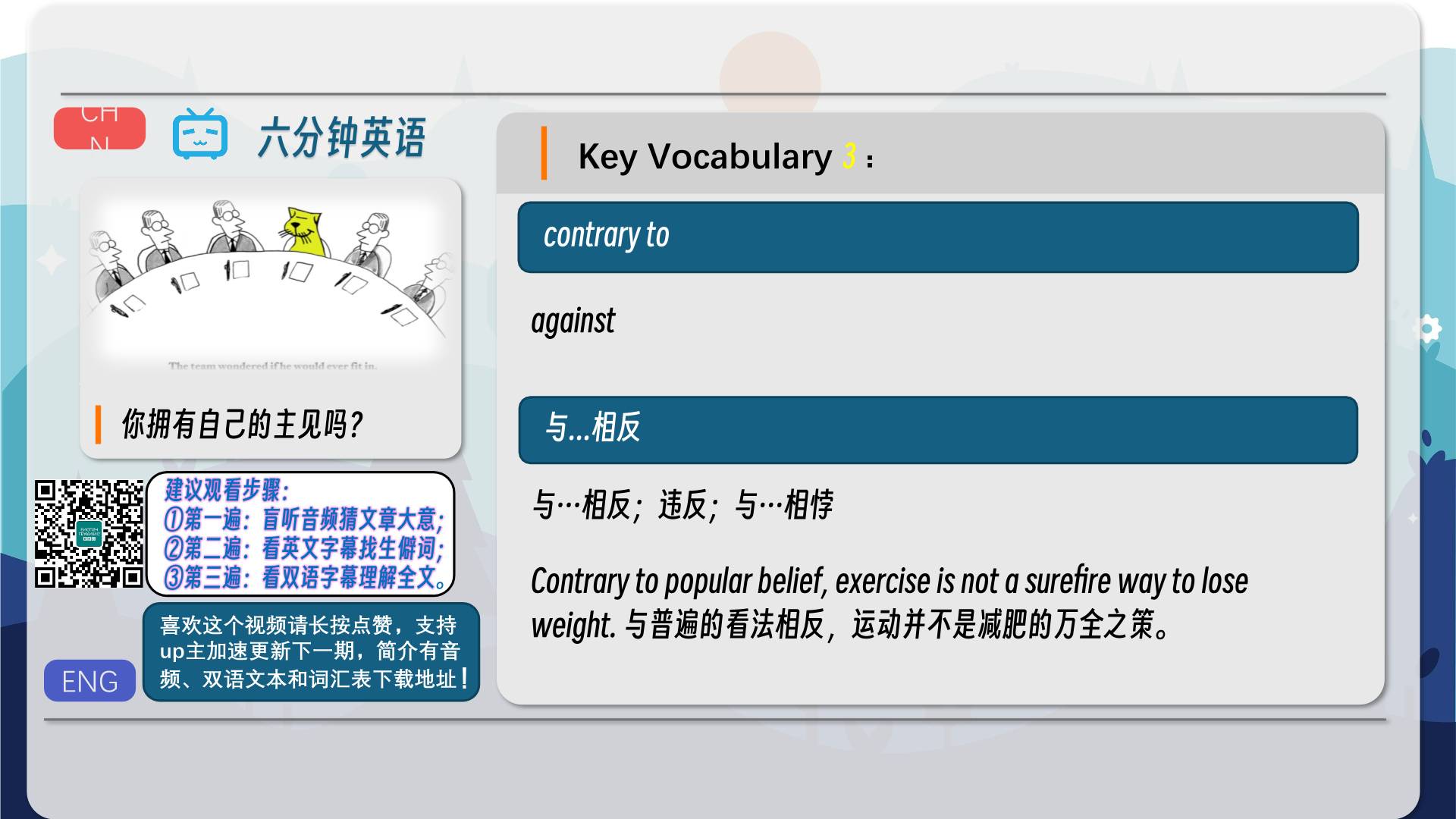
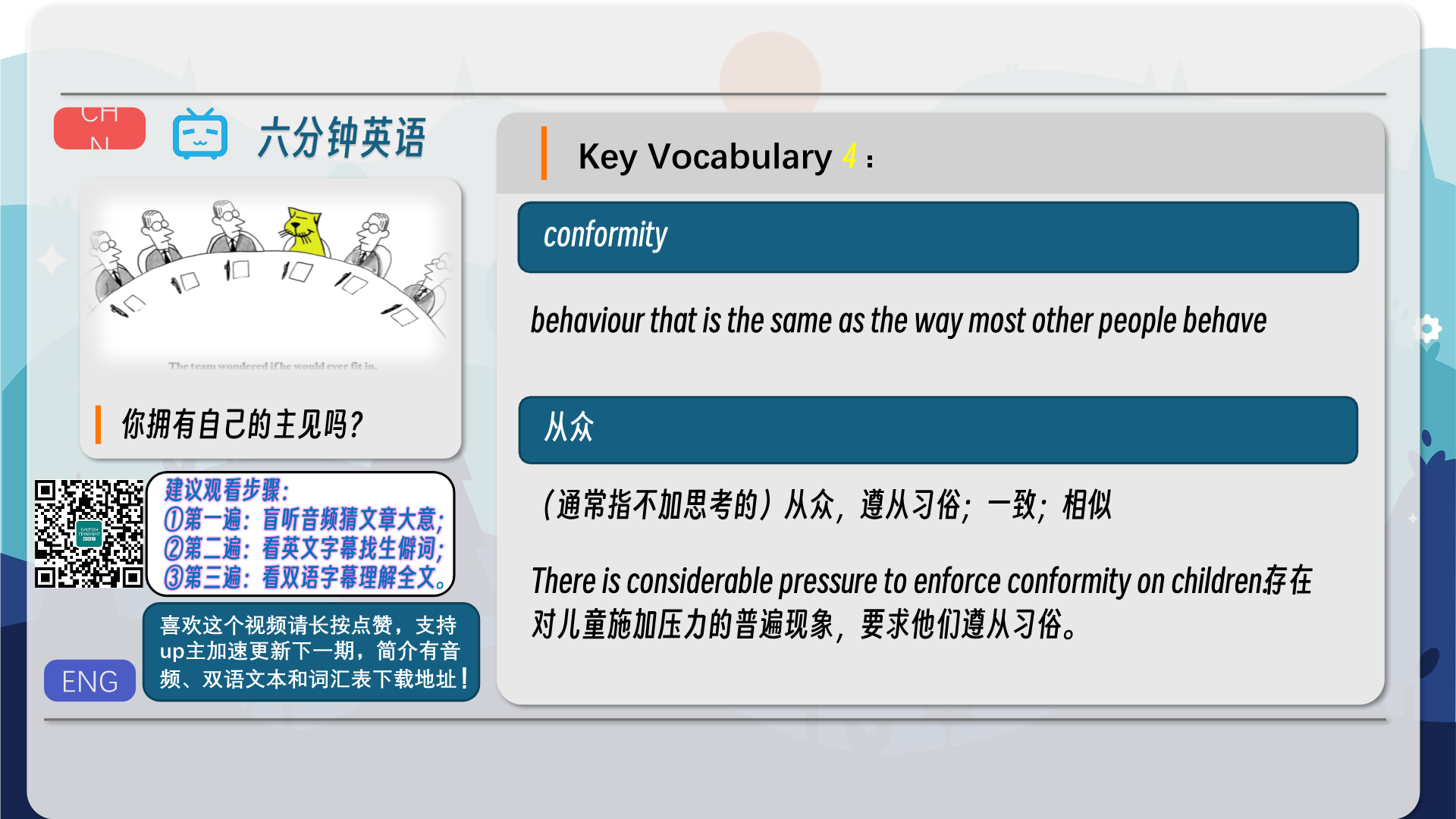
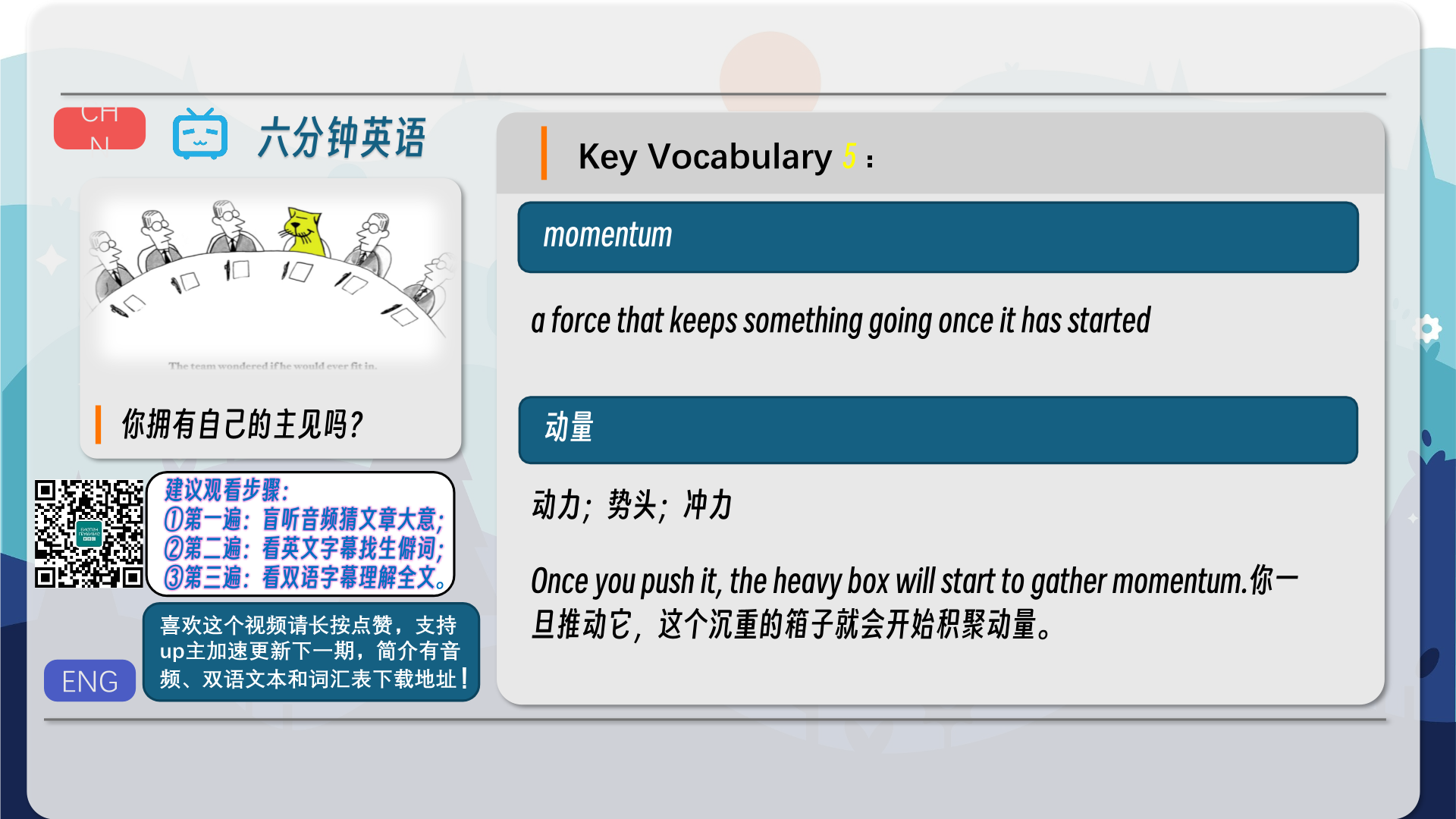
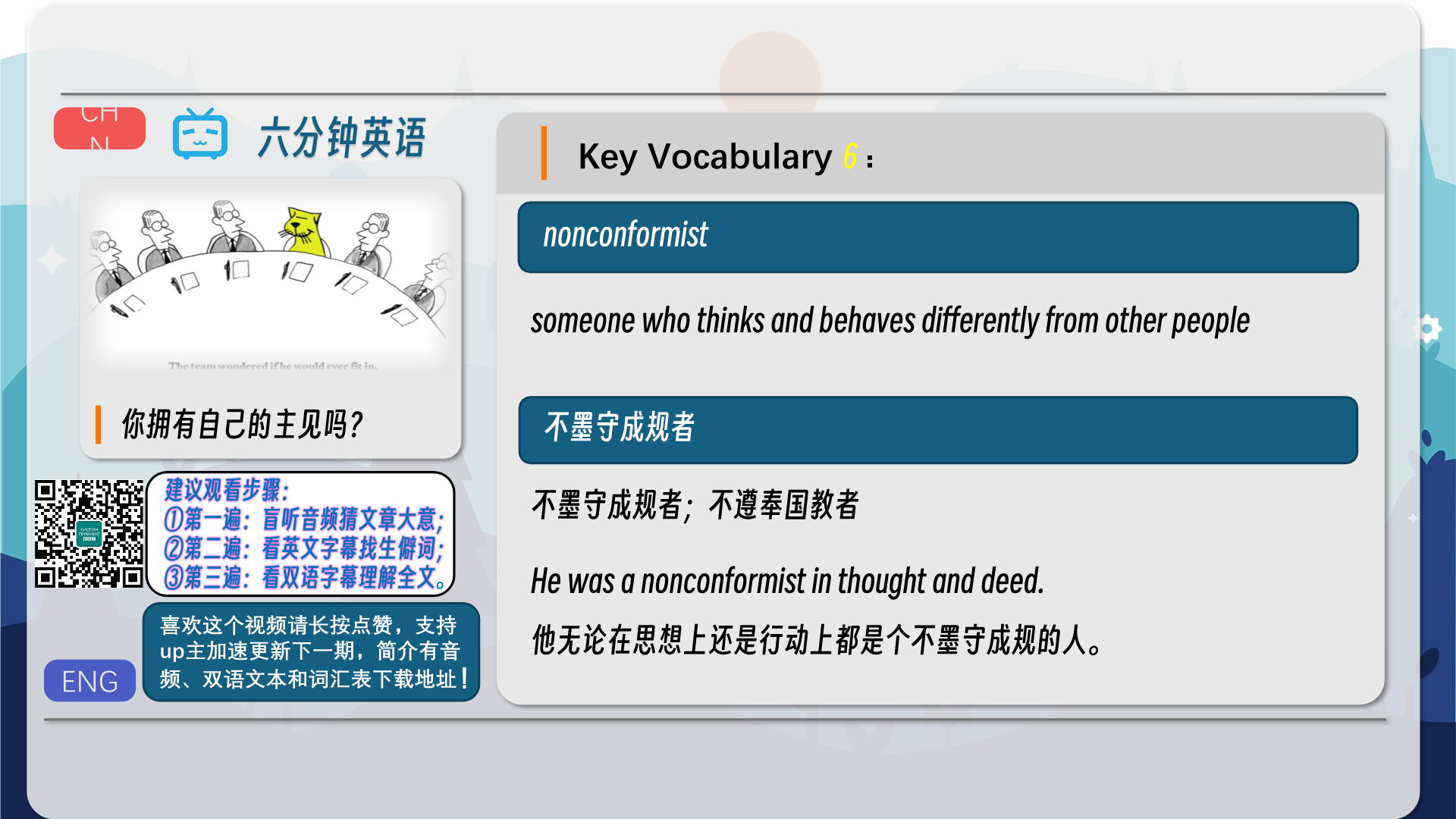
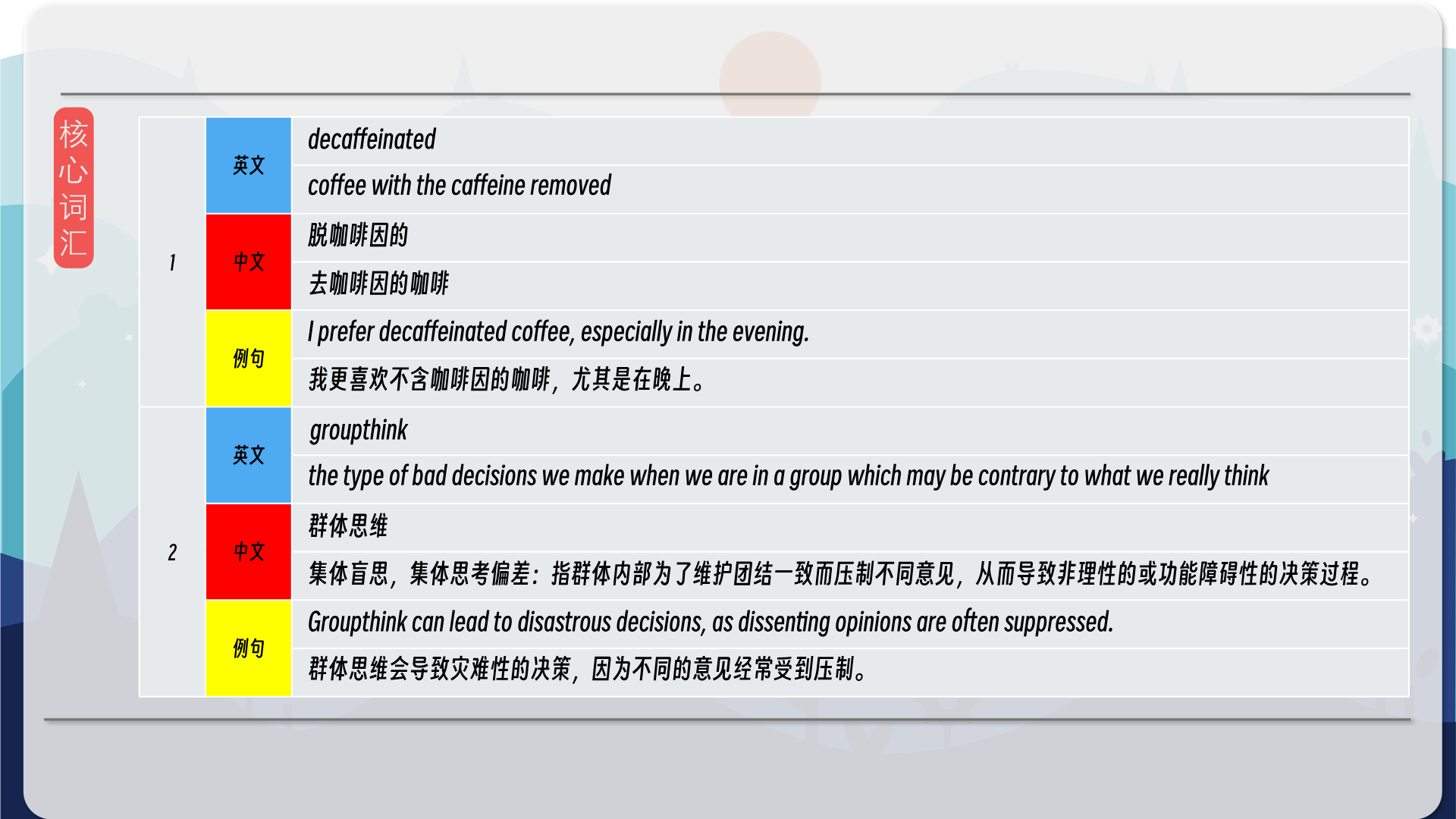
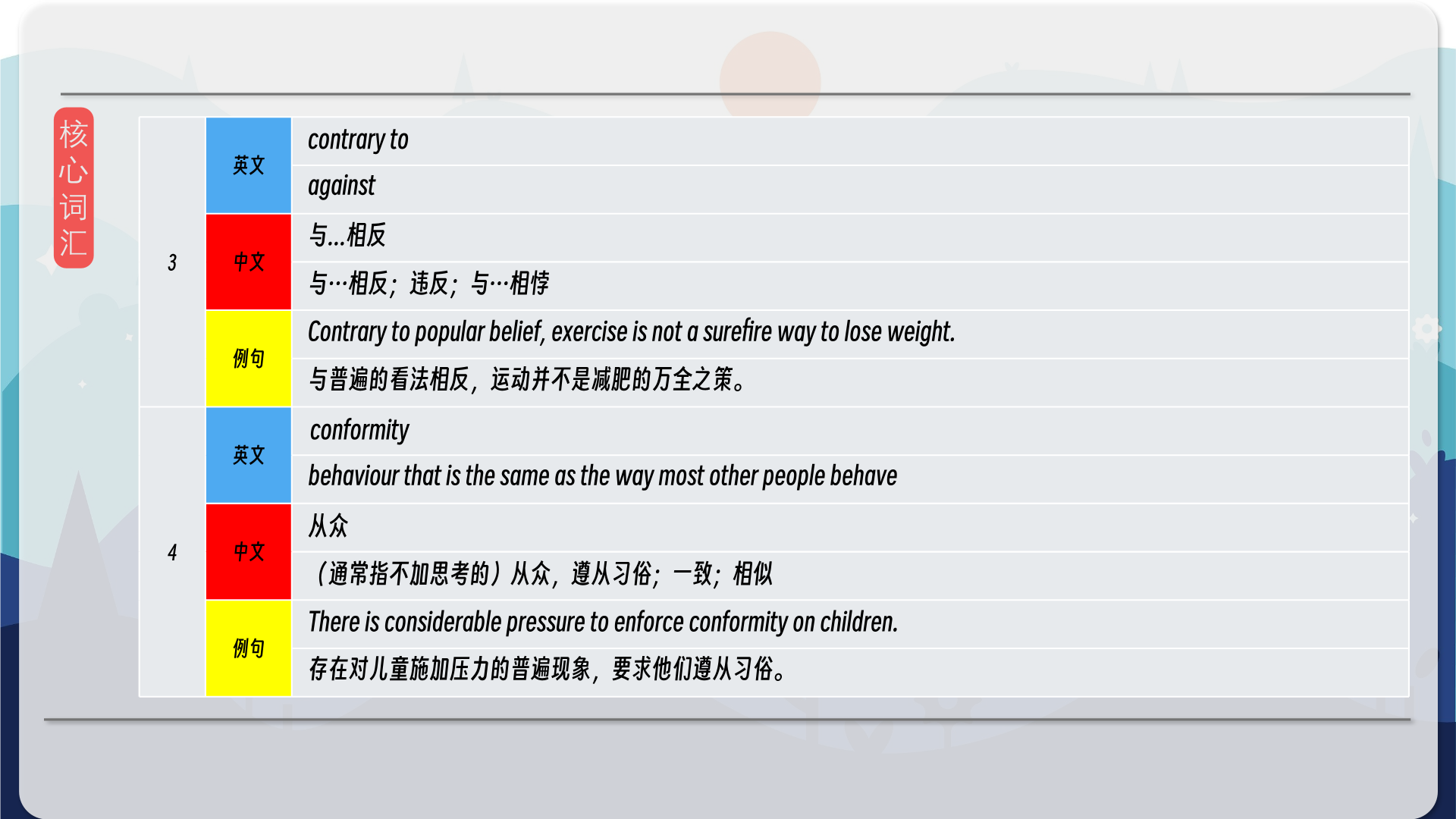
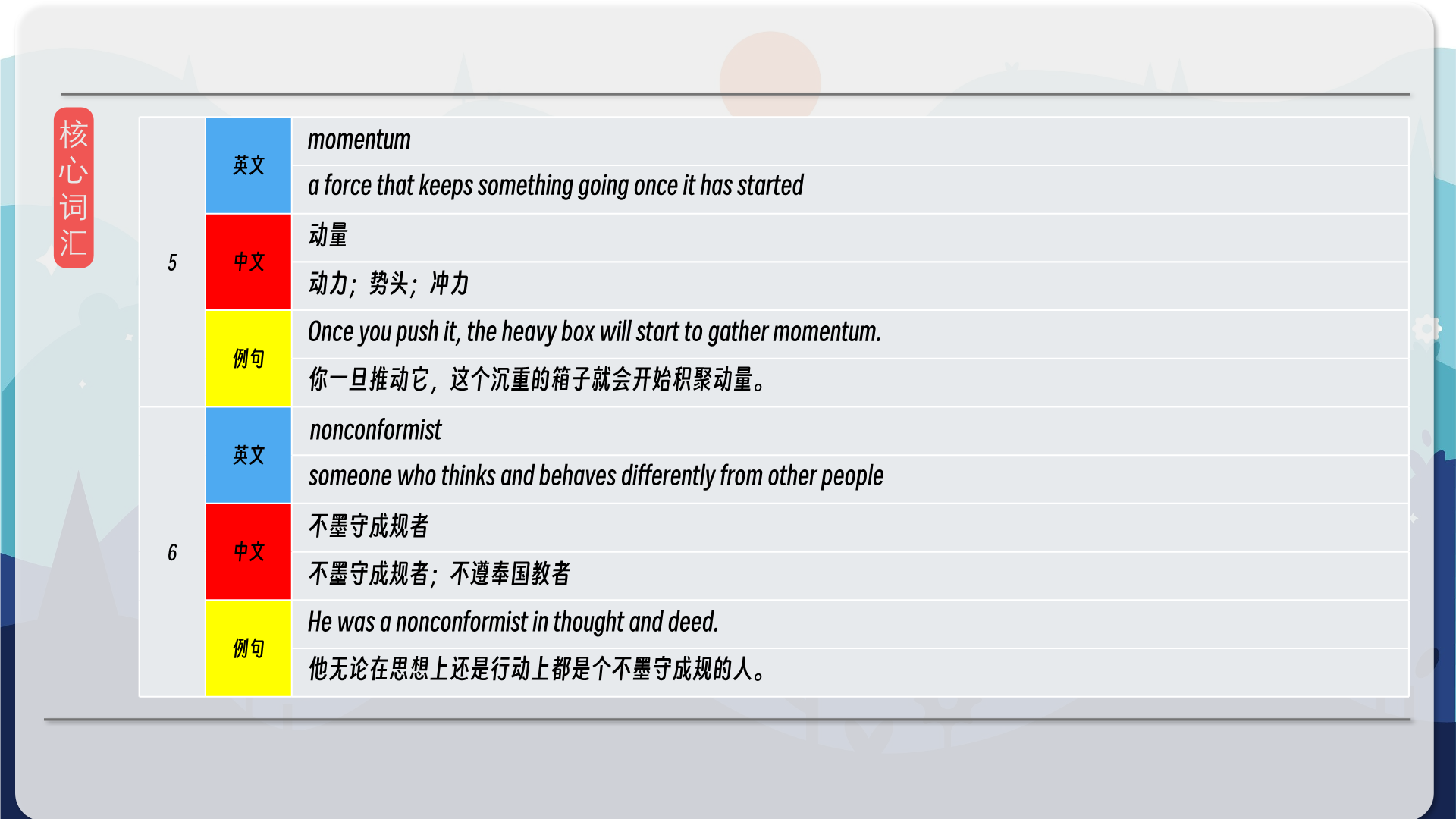
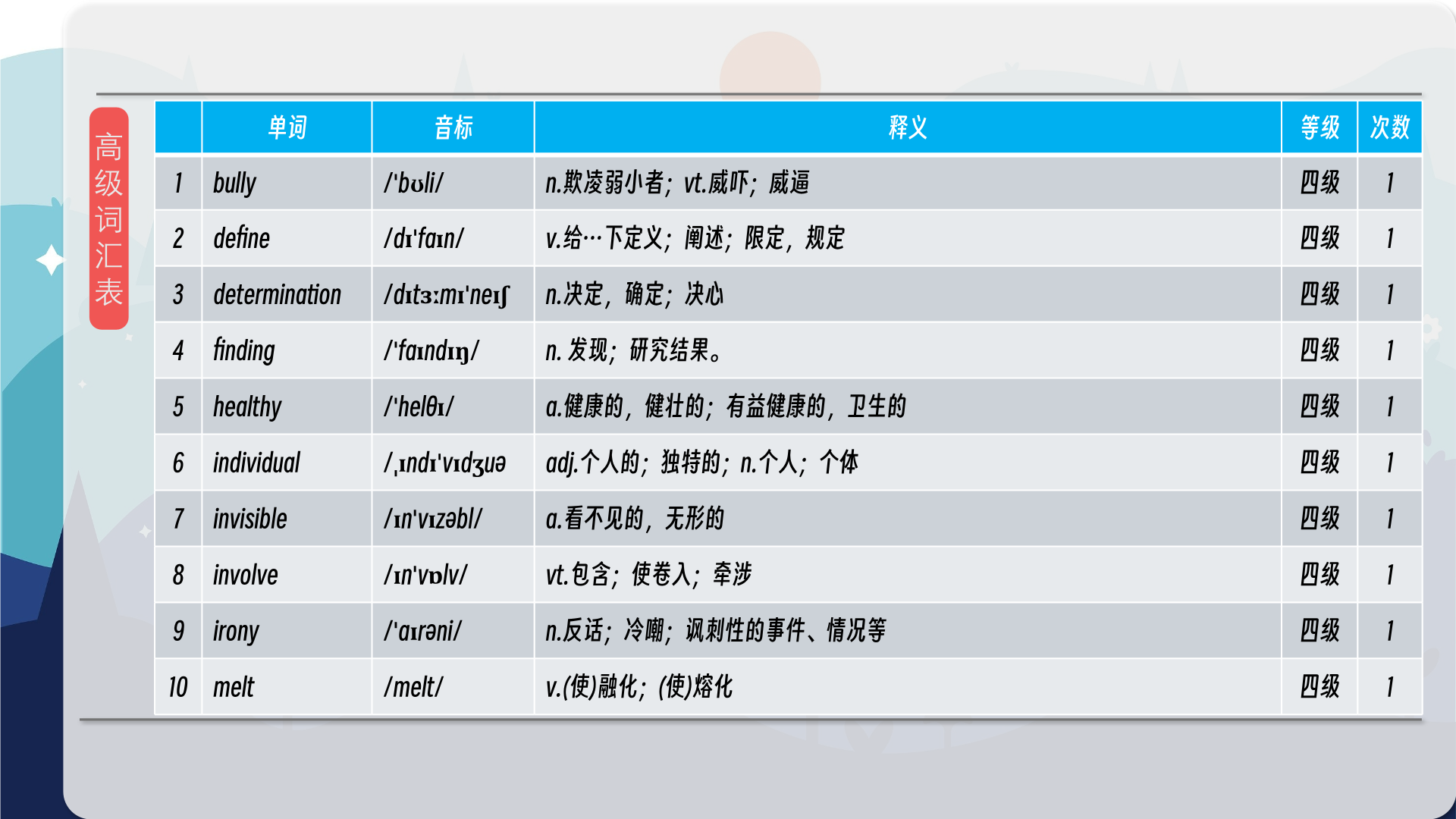
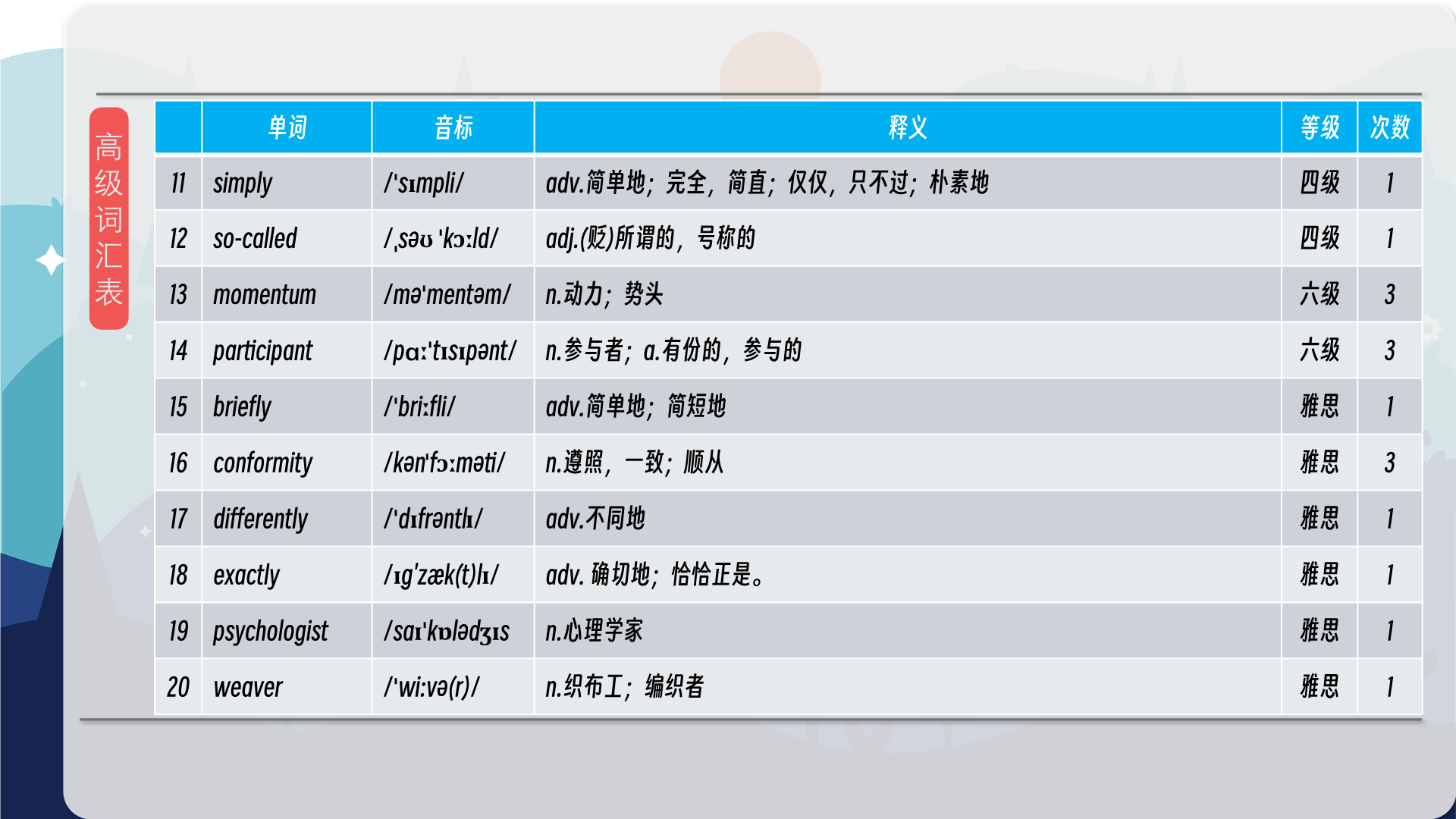

【核心词汇】
decaffeinated
coffee with the caffeine removed
脱咖啡因的
去咖啡因的咖啡
I prefer decaffeinated coffee, especially in the evening.
我更喜欢不含咖啡因的咖啡,尤其是在晚上。
groupthink
the type of bad decisions we make when we are in a group which may be contrary to what we really think
群体思维
集体盲思,集体思考偏差:指群体内部为了维护团结一致而压制不同意见,从而导致非理性的或功能障碍性的决策过程。
Groupthink can lead to disastrous decisions, as dissenting opinions are often suppressed.
群体思维会导致灾难性的决策,因为不同的意见经常受到压制。
contrary to
against
与…相反
与…相反;违反;与…相悖
Contrary to popular belief, exercise is not a surefire way to lose weight.
与普遍的看法相反,运动并不是减肥的万全之策。
conformity
behaviour that is the same as the way most other people behave
从众
(通常指不加思考的)从众,遵从习俗;一致;相似
There is considerable pressure to enforce conformity on children.
存在对儿童施加压力的普遍现象,要求他们遵从习俗。
momentum
a force that keeps something going once it has started
动量
动力;势头;冲力
Once you push it, the heavy box will start to gather momentum.
你一旦推动它,这个沉重的箱子就会开始积聚动量。
nonconformist
someone who thinks and behaves differently from other people
不墨守成规者
不墨守成规者;不遵奉国教者
He was a nonconformist in thought and deed.
他无论在思想上还是行动上都是个不墨守成规的人。
在公众号里输入6位数字,获取【对话音频、英文文本、中文翻译、核心词汇和高级词汇表】电子档,6位数字【暗号】在文章的最后一张图片,如【220728】,表示22年7月28日这一期。公众号没有的文章说明还没有制作相关资料。年度合集在B站【六分钟英语】工房获取,每年共计300+文档,感谢支持!